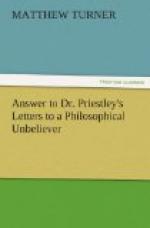If then I am admitted to explain my deity in this sense, I am not an atheist, nor can any one else in the world be such. The vis naturae, the perpetual industry, intelligence and provision of nature must be apparent to all who see, feel or think. I mean to distinguish this active, intelligent and designing principle, inherent as much in matter as the properties of gravity or any elastic, attractive or repulsive power, from any extraneous foreign force and design in an invisible agent, supreme though hidden lord and maker over all effects and appearances that present themselves to us in the course of nature. The last supposition makes the universe and all other organised matter a machine made or contrived by the arbitrary will of another Being, which other Being is called God; and my theory makes a God of this universe, or admits no other God or designing principle than matter itself and its various organisations.
The inquiry is said to be important. But why is it so! All truth is important. It is a question of little importance, merely whether a man had a maker or no, although it is of great importance to disprove the existence of such a Deity as theologians wish to establish, because appearances in the world go against it. Supposing however that it was granted, that the question, whether there is a Deity or not, was as little important as other truths, yet the question becomes important with this reflexion, that other events may follow as deductions; such as a particular providence, or a future state of rewards and punishments; but whether such deductions or either of them necessarily follow may well be queried. As to a particular providence you give up the reality of it, and I give it up too. But I cannot give up the argument, that if there were a God with all his allowed attributes of wisdom, power and justice, there ought to be a particular providence to counteract the general laws of nature, in favour of those who defend the interposition. Though the Deity should not interfere unless there be a worthy cause, agreeable to the Horation rule,
"Nec Deus interfuit nisi vindice nodus;"
Yet surely from the same principles it should follow that the Deity ought to interfere where there is a worthy cause. Here however arises another dilemma, for if the Deity has really those attributes of power and justice, there would never have been occasion for such temperaneous interpositions. A particular providence must indeed prove one of these two principles, either that God was imperfect in his design, or that inert matter is inimical to the properties of God. If that wished for interposition of the Deity is put off to a future existence, I cannot help observing, that future day has been already a long while waited for in vain, and any delay destroys some one attribute or other of the Deity. He wants justice, or he wants the power, or the will to do good and be just. That a future state of rewards and punishments may




